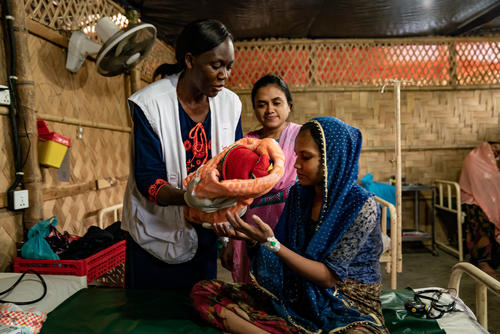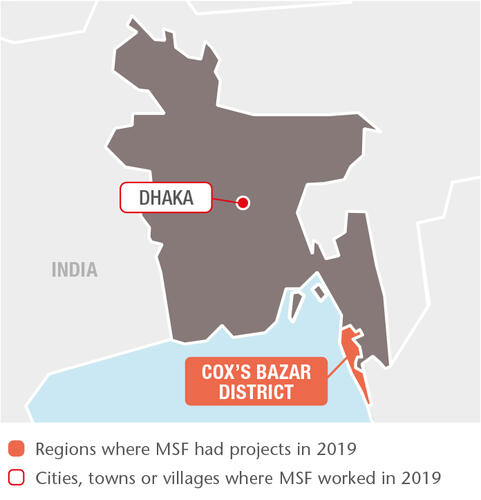
388M
388M
556,300
556,3
27,700
27,7

3,400
3,4
At the end of 2019, MSF remained one of the main providers of medical humanitarian assistance to the stateless Rohingya, approximately one million of whom live in the largest refugee camp in the world, in Cox's Bazar. More than two years since the initial emergency, people still live in the same overcrowded and basic bamboo shelters, entirely dependent on aid and with little hope for the future. Outbreaks of water-borne and vaccine-preventable diseases, such as measles, acute watery diarrhoea and diphtheria, pose a serious ongoing threat.
Throughout 2019, MSF teams focused on improving the quality and reach of our healthcare, working closely with the refugee community to improve our understanding of their needs and build trust in our services. This resulted in a significant increase in the number of people, especially women, attending our facilities. More women are now giving birth in our maternity units, with 2,670 births across all our facilities in Cox’s Bazar.
We began to adjust our activities to ensure longer-term sustainability and handed over a number of facilities to local organisations, including an extensive network using solar energy to power the supply of clean drinking water. By the end of 2019, we were running three hospitals, three general health centres, one health post, two specialised clinics and four outbreak response facilities. These provide a range of inpatient and outpatient services, including emergency and intensive care, paediatrics, obstetrics, sexual and reproductive healthcare, as well as treatment for victims of sexual violence and patients with non-communicable diseases, such as diabetes and hypertension. Our teams celebrated the 10th anniversary of Kutupalong field hospital, which has served Rohingya refugees and the local Bangladeshi community since it opened in 2009.
Rohingya refugees struggle with unemployment, dire living conditions and a sense of hopelessness, coupled with traumatic memories; we have seen an increasing number of people with mental health problems in our facilities. We have expanded our mental health services in response to the evolving needs, and more people are attending our individual and group counselling sessions. In Cox’s Bazar, MSF remains the largest provider of specialised psychiatric care for Rohingya refugees and local Bangladeshis suffering from mental disorders such as psychosis, anxiety and epilepsy.
Kamrangirchar
Our teams in Dhaka continue to run a unique occupational health programme in Kamrangirchar, an inner-city area close to hundreds of small-scale factories. We deliver medical care tailored to the needs of the people working there We deliver medical care tailored to the needs of the people working there in conditions that are often extremely hazardous. In 2019, we conducted 10,500 occupational health consultations for factory workers and started a new mobile health clinic specifically for tannery workers. We also run sexual and reproductive health services for girls and women, carrying out almost 11,500 antenatal consultations and assisting 700 births during the year, and offering comprehensive treatment for victims of sexual and intimate-partner violence, with integrated mental health support.

















